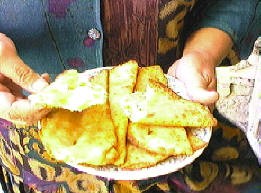 Gumahs (fried pasties)
Gumahs (fried pasties)One day the boys decided to amuse themselves by holding a wrestling competition. The Russian prince, Alexander, was drawn to fight with a burly German but Temur, knowing Alexander's sickly condition, offered to compete in his place. He concluded that since he came from Khiva, the home of 'kuresh' (a form of wrestling), he could fight just as well as the European boys. He was right. He won his match, much to the delight of Alexander who promised to ask his father, Nicolai II, to present Temur with a Russian army captain's uniform as a thank you. (A photograph of Temur proudly wearing this uniform can be found amongst the old photographs in the Pakhlavan Mahmoud Mausoleum.)
When the sightseeing finished, Temur returned home with a new thirst for discovering his own land of Khorezm. He began to make forays into the world beyond the luxurious royal palaces and on one occasion met a poverty-stricken old granny whose only son had fallen in battle when fighting for the Khan. The ever kind-hearted Temur felt a sense of responsibility for her plight and promptly ordered one of the palace kitchen boys to provide hearty meals for the old woman three times a day. Spurred on by Temur's assurance of promotion, the boy agreed and duly prepared delicious food for the grateful old lady.
Months passed but the boy remained slaving away in the palace kitchens, his dreams of culinary greatness slowly becoming sour. After a while he realised that promotion was never coming and that the only way to lessen his work was to get rid of the old woman. The next day the kitchen boy prepared her favourite dish, 'gumahs' (fried pasties), secretly spiking each one with drops of lethal poison.
However his plan took a turn for the worse when Temur unexpectedly called in on the old lady later that day. A typical Central Asian hostess, she thanked the prince for his consideration and pressed him to eat all the delicious pasties himself. The inevitable happened and the twelve-year-old Temur tragically died that day. The whole city was shocked at his sudden death and many foreign kings and ambassadors sent messages of condolences to his funeral, including Tsar Nicolai II and his son, Alexander.




